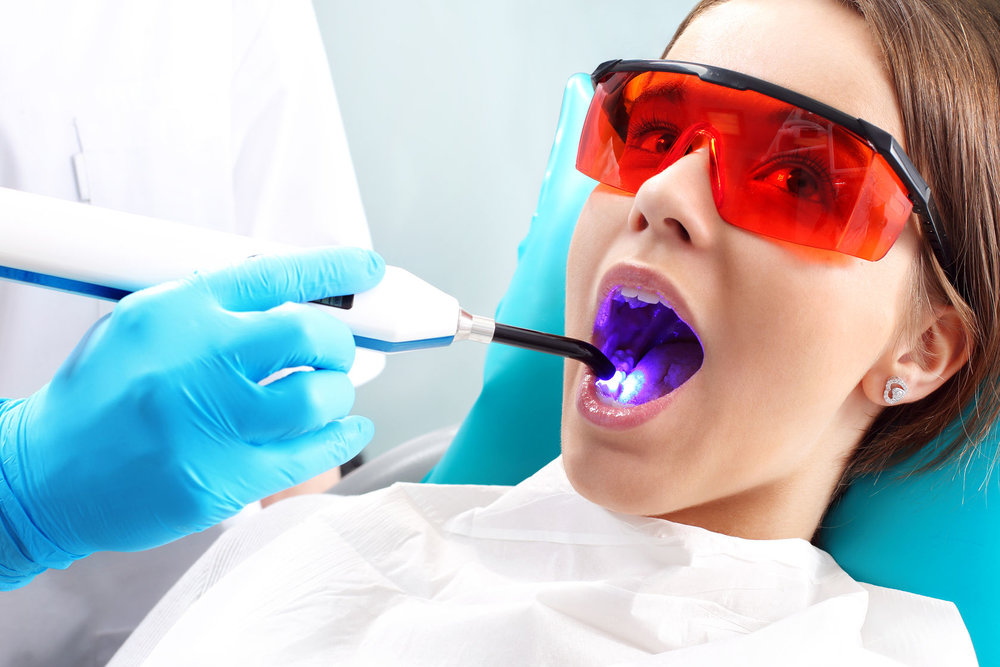It’s a Snap!
An exciting new form of dental technology is changing the way dentists — and patients — view dentistry. You may be aware of the use of lasers in cosmetic dentistry, but laser dentistry is also enhancing many types of dental surgery for your comfort and convenience!
Dental laser surgery uses a beam of intense light to correct your dental problems. The energy produced by the laser actually “cuts” away or vaporizes the tissue it is concentrated on. Dental lasers remove bacteria and infection then cleanse the area in preparation for the restoration — usually in less time and with less irritation than a dental drill. Laser surgery often means less discomfort, an easier recovery and fewer or shorter appointments than most conventional dental treatments.
Lasers have several uses for dental surgery. Some common types of dental laser surgery include but are not limited to:
Dental Cavities — Dental lasers are not only used to remove tooth decay but can also “cure,” or harden, composite resin fillings. Some lasers are also beneficial in detecting cavities.
Endodontics — The laser melts away the infection within the tooth’s root without the need for drills or files. Lasers also clean the sensitive tubules of the dentin better, removing more bacteria and reducing the possibility of a failed root canal.
Gum Surgery — Laser periodontal therapy removes the infection below the gum line and reshapes your gums. This innovative treatment has significantly minimized the recovery period often associated with gum disease treatment.
Dental Abscess — Dental lasers can be used to open and drain a dental abscess.
Biopsy — Laser surgery has been used to remove small amounts of tissue to check for oral cancer, eliminating the need for knives or invasive surgical procedures.
Lesions — Dental lasers can also remove oral lesions or minimize the discomfort of cold sores and canker sores.
To Each Their Own
While most dental patients would jump at the chance of using a high-tech device to make their dental appointments easier, some may feel more comfortable with the dental equipment they’ve grown accustomed to. Regardless, many dental lasers have been approved by the FDA and in the right hands, dental lasers are extremely safe. It’s important to note that all lasers require eye protection — your dentist should give you special glasses to wear prior to the procedure.
If you’re considering laser surgery, you should weigh all of your options before moving forward with dental treatment:
Advantages:
- There’s no “whirling” sound of the drill. In fact, lasers don’t make any sound at all!
- Dental treatments are performed in less time, reducing the length of your appointment.
- Dental lasers often minimize the discomfort associated with dental surgery, reducing the need for local dental anesthesia and possibly even sedation dentistry.
- Less of your healthy tooth structure is removed during dental cavity preparation.
- The dental laser seals off blood vessels, minimizing the possibility of bleeding gums and eliminating the need for stitches in some cases.
- Lasers cleanse and serialize the area better, reducing bacteria and other irritants.
- The possibility of post-surgery complications, including swelling, infection and pain, are significantly reduced.
- Patients report that less post-treatment healing time is required with dental laser surgery.
- Laser surgery is an excellent option for those who suffer from dental anxiety.
Disadvantages:
- Dental laser surgery can’t be used for cavities between teeth, large cavities, dental crown preparation or dental bridge preparation.
- Dental lasers aren’t designed to penetrate a current tooth filling or remove a dental crown.
- Although reduced, there still may be some need for dental anesthesia.
- Lasers aren’t bendable and may not be able to reach all areas of the tooth.
- Dental lasers sometimes need to be used in combination with drilling.
- Laser surgery procedures can be more expensive than traditional dental treatments. Most insurance plans will not cover the extra expense of the laser.
- Not every dentist has the equipment or is trained to use laser surgery methods.
One More Thing…
There are several types of lasers being used to replace traditional dental surgery methods. Waterlase® is a well-known dental laser commonly used to treat tooth decay and root canals while PerioLase® is specifically designed to treat gum disease. There are many other dental laser brands on the market — ask your dentist about the specific features of the dental laser found at their office.

